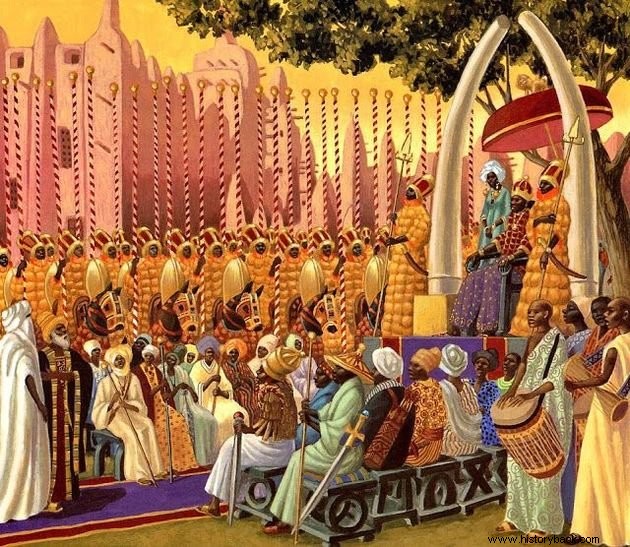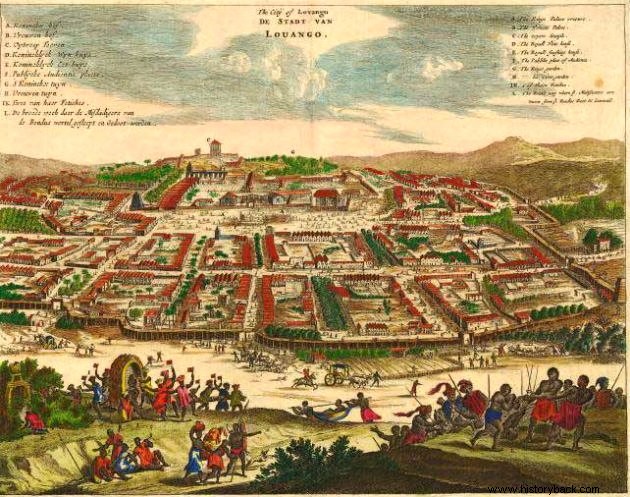Before the arrival of Europeans, Africa had rich and fabulous kingdoms.
In antiquity, we have the empire of Carthage and Egypt; and in the Middle Ages, the constitution of the Empire of Mali and Ethiopia.
Through the cities of North Africa, contact and trade with European countries was established.
Introduction
The African continent is considered the cradle of humanity, because there are the first archaeological evidences of the human being.
Before the European occupation there was already an intense trade between North Africa and sub-Saharan Africa.
These commercial transitions were carried out through caravans promoted by peoples who inhabited the southern portion of the Sahara desert. Later, other expeditions would cross the desert and take these products to Europe.
African Kingdoms
For study purposes, let's see just a few kingdoms and empires from each of the African regions:
North Africa
- Ancient Egypt - in North Africa was created one of the most fascinating civilizations in the world:the Egyptian. Lasting over three thousand years, they built impressive cities and left a legacy in science, astronomy and architecture. See also:Ancient Egypt
- Carthaginian Empire – was constituted in the union of several cities in North Africa that shadowed the Roman Empire. The Punic Wars, as the disputes between the two powers are called, are one of the most remarkable events of antiquity.
East Africa
- Empire of Ghana – century 8 to 11 – was based on the gold trade with African kingdoms and Mediterranean cities whose merchants took it to Europe. Prosperity ends due to the exhaustion of mines and constant attacks on caravans.
- Mali Empire – century 13 to 18 – it was a crossing of caravans that came from the south and brought salt, gold, spices and leather. The empire was immensely wealthy and Emperor Mansa Moussa, a devout Muslim, when he made his pilgrimage to Mecca, was accompanied by more than six thousand people and countless sums of silver.
 See also:Sub-Saharan Africa
See also:Sub-Saharan Africa West Africa
Ethiopia Empire – 1270 -1975 – occupied the territories of Ethiopia and Eritrea. Also known as Abyssinia, it managed to fend off the Arab and Turkish invaders and was the only African empire to resist the European colonizer. Even the Italians could never fully master it.
South Africa
- Kingdom of Congo – 1390 – 1914 - it constituted the place where today is the north of Angola, the current Congo and a part of Gabon. Led by macongo , the kingdom of Congo was independent until the 18th century when it became a vassal of Portugal.
- Sultanate of Kilwa – century 10-13 – the territory was inhabited by Bantu who were conquered by Muslims. It dominated the coast of southwest Africa and its main cities included Mogadishu, Mombassa and the islands of Pemba and Zambzibar, among others.
- Zulus – 1740 – 1879. The Zulu kingdom was located in the lands of South Africa, Lesotho, Swaziland, Zimbabwe and Mozambique. They were the first to realize the danger of the white colonizer's permanence and fought against the British, but were defeated.

Islamism
Muslim expansion strengthened contact between Africans and Europeans. The adherents of Islam left present-day Saudi Arabia and conquered North Africa until they reached southern Europe.
Islam reinforced trade routes and cultural ties, trying to maintain the expansion to the south of Africa, but they were impeded due to the resistance of the peoples who inhabited there.
In parallel, leaders of the conquered countries of the North, such as Egypt and Morocco, converted to Islam, which passed to Muslim rule. From North Africa, Muslims managed to reach the west, in the region known as the Maghreb.
During the second half of the 7th century, they entered the continent, crossed the Mediterranean Sea and conquered the southern portion of Europe, such as the Iberian Peninsula, where Spain and Portugal are located.
It is necessary to understand that Christians and Muslims alternated periods of peace with that of war. When there were no conflicts, business flowed both ways.
See also:Reconquest of the Iberian PeninsulaAfrican Periplus
It was only in the 15th century that the Kingdom of Portugal intensified its incursions across the Atlantic Ocean in search of new lands and trade routes. The Portuguese arrived in India around the African coast of the Atlantic in the set of conquests that became known as the African journey .
The first point dominated by the Portuguese was Ceuta, in 1415. Then came Cabo do Bojador (1434), Rio do Ouro (1436), Cabo Branco (1441), Cabo Verde (1445), São Tomé (1484), Congo ( 1482), Mozambique (1498) and Mombasa (1498).
See also:African PeriplusRead more:
- The First Great Navigations
- European Maritime Expansion
- Conquest of Ceuta
- Sharing Africa
- Countries of Africa
- African Culture
- Berlin Conference
